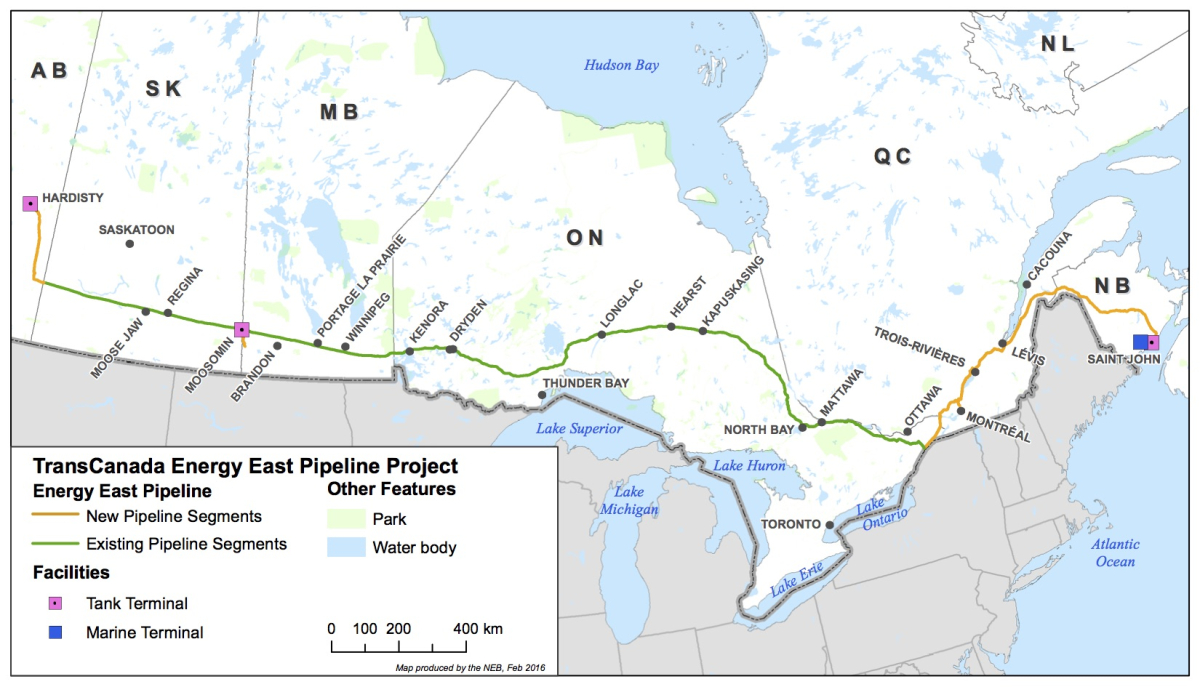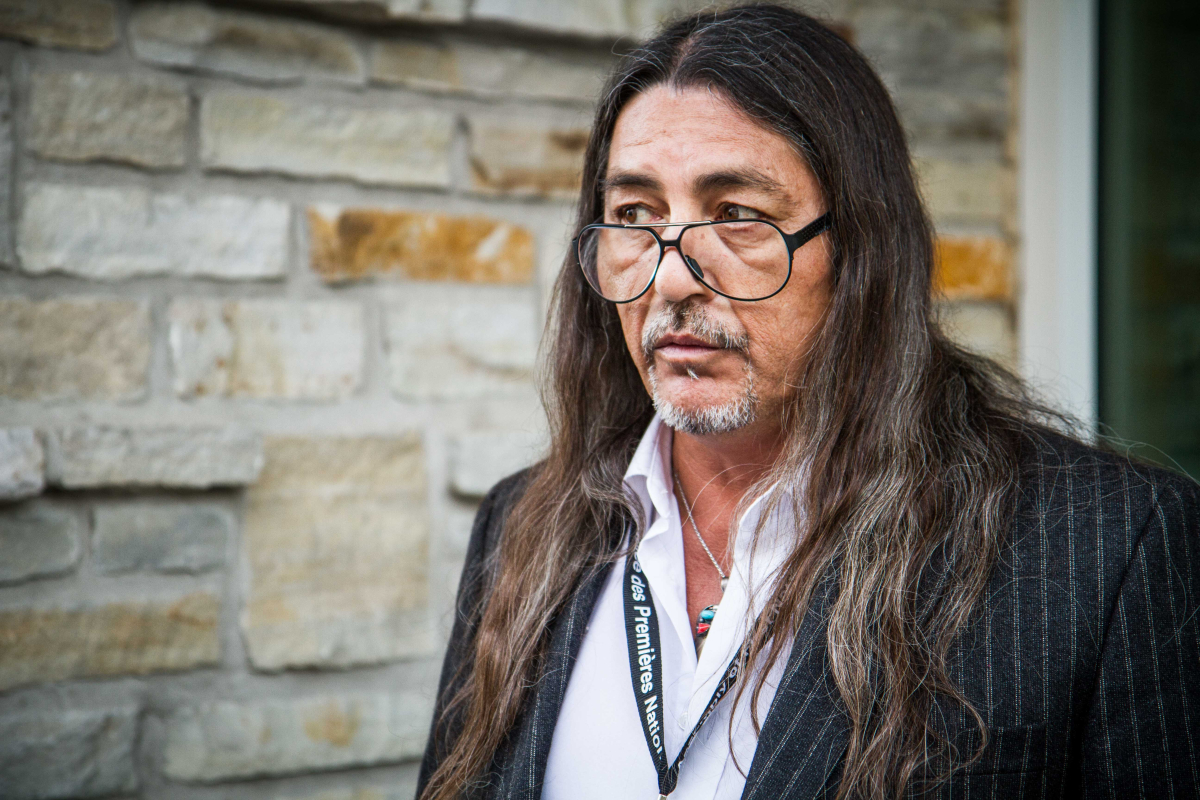Support strong Canadian climate journalism for 2025
After months of public criticism for its review of major pipeline projects, the National Energy Board (NEB) has announced that all decisions made by the original Energy East panel are officially void.
The new hearing panel for the controversial TransCanada Corp. project ruled on Friday that all decisions made by the previous panel members, who recused themselves in September last year, will be removed from the official hearing record. Panel members Roland George, Lyne Mercier and Jacques Gauthier stepped down from their positions amidst conflict of interest allegations. NEB chairman and chief executive officer Peter Watson also recused himself from dealings with the Energy East proposal following allegations that he appeared to be bias.
The new hearing panel, assigned earlier this month, will now reconsider whether the Energy East application is "complete," the list of participants in hearings, individual rulings on participation, and the hearing order itself. It will also decide the list of issues and factors to be included in the environmental assessment, under the Canadian Environmental Assessment Act, 2012.
Panel decides it was "the right thing to do"
“I think it would be fair to say starting from scratch almost, because they’re really restarting from the beginning," NEB communications officer Marc Drolet told National Observer. “They decided that starting from the beginning was the right thing to do and they will be looking at all the previous decisions that have been made. They will make new decisions.”
The decision also applies to TransCanada's lesser-known Eastern Mainline project, a proposal to add 250 kilometres of new natural gas pipeline facilities and nine compression facilities to an existing natural gas system in southern Ontario. The Energy East pipeline, the largest pipeline proposal in Canadian history, is 4,500-kilometre project that, if approved, would ship up to 1.1 million barrels of oil per day from producers in Alberta, Saskatchewan and North Dakota to refineries and marine ports in Quebec and New Brunswick.

All hearing steps and related deadlines are no longer applicable, said an NEB press release on Friday morning. The new hearing panel, consisting of bilingual appointees Don Ferguson, Carole Malo and Marc Paquin, will decide how to move forward with the hearing. They will also decide whether to consider the Energy East and Eastern Mainline proposals in a single hearing.
In a media statement, TransCanada's Tim Duboyce said the Calgary-based energy company will review the new panel's decision "to understand it's impact on TransCanada and the project."
"Energy East represents a new opportunity to bring Canadian oil to market more safely and with lower emissions than by train, while creating thousands of jobs all across the country and generating billions of dollars in new tax revenues and GDP growth," said Duboyce. "Energy East remains of critical strategic importance because it will end the need for refineries in Quebec and New Brunswick to import hundreds of thousands of barrels of foreign oil every day, while improving overseas market access for Canadian oil."
Lawyers, environmentalists pleased with decision
While TransCanada insisted that Energy East will help revitalize slumping provincial economies, opponents of the project celebrated the reset in the pipeline's proceedings. The project's critics argue that if approved, Energy East will cross more than 3,000 waterways from Alberta to New Brunswick, push Canada's climate change goals out of reach, and expose sensitive ecosystems to risk of an oil spill.
Ecojustice welcomed the news on Friday warmly. Earlier this month, the environmental law firm filed a new legal motion to stop the Energy East process in its tracks after a National Observer investigation revealed last summer that members of the original panel had met in secret with former Quebec premier Jean Charest, who was, at the time, contracted by TransCanada.
Two of the panel members, Gauthier and Mercier, along with chairman Watson, provided the ex-politician with advice on how to effectively engage with Quebec residents on the Energy East pipeline. After September's recusals, Ecojustice argued that the entire Energy East review process had been permeated with "bias," and the only solution to avoid the perception of conflict of interest was to start from scratch.
“It’s certainly a striking decision from the board, and it’s one that we welcome," said Ecojustice lawyer Charles Hatt. "It shows they’re taking seriously and understanding and giving effect to procedural fairness inCanada, which is something that has been a major critique of the National Energy Board."
"Today’s ruling by the new Energy East panel to void all decisions to date and restart the review from scratch is the right move," added Environmental Defence’s Patrick DeRochie. "The decision is in the best interest of all parties after the pipeline review was tainted beyond repair by the perception of bias."
The panel's decision also reflects demands made by the new pan-continental Treaty Alliance Against Tar Sands Expansion, an alliance of 122 indigenous nations across North America that oppose expansion of Alberta's oilsands, and all pipeline projects, rail and tanker traffic associated with it. Grand Chief Serge Simon of the Mohawk Council of Kanesatake said the NEB had no choice but to start over with Energy East.
“Kanesatake has said from the beginning that the NEB process is a sham and the NEB decision today confirms that,” he said in a media release. “But the meeting in question with Jean Charest that led to all of this was just the tip of the iceberg – the NEB is a biased and broken institution that has been rubber stamping tar sands pipelines for years.”
The new panel has decided that project applications do not need to refile their applications, and if it determines that the existing applications are still "complete," the 21-month time limit will start from scratch. Drolet said if the panel decides the applications are not complete, it could ask TransCanada to provide "additional information."

More work to be done on pipeline reviews
Despite Friday's news however, environmental organizations and First Nations say that the embattled NEB still has a lot of work to do before public confidence is restored in its ability to evaluate major energy projects. Despite hitting the reset button on Energy East, they argue, projects will still be reviewed under the same environmental assessment laws created by the Stephen Harper administration, despite Prime Minister Justin Trudeau's election promise to overhaul the way such reviews are done in Canada.
Environmental assessments, according to Environmental Defence, must involve more robust consideration of Canada's climate goals, full public participation, greater consultation with indigenous leadership, and high-quality energy data provided by experts outside of oil and gas industry employ. They should also be conducted by an environmental body rather than the NEB, says the organization, and in order to ensure diverse regional representation, NEB commissioners should not have to reside in Calgary.
"For the new review of Energy East to be credible, the process cannot be restarted until the reform of the National Energy Board (NEB) and Canada’s environmental assessment laws is complete," said DeRochie. "The federal government admitted that the current process is broken and appointed an expert panel to modernize the NEB."
Keith Stewart, senior energy strategist for Greenpeace Canada, agreed:
"There is no way that the new review should be allowed to go ahead under the old rules, which are being re-written as we speak to address the structural pro-industry bias introduced by the Harper government and to incorporate consideration of climate change impacts."
Concerns about Keystone, Kinder Morgan
As a result of these concerns, the federal government is facing at least four lawsuits related to recent approvals of the Kinder Morgan Trans Mountain expansion and Enbridge Line 3 pipeline projects. Signatories to the Treaty Alliance Against the Tar Sands say the pipelines were subject to an "illegitimate review."
As TransCanada prepares a new application for the Keystone XL pipeline with President Donald Trump's approval, they have called on the federal government to deliver on its domestic and international climate targets, and promises to respect indigenous rights.
“First Nations demanded Prime Minister Trudeau live up to his oft-repeated campaign promise to not approve pipelines until the NEB was overhauled, but as we saw, Trudeau chose to merely tinker and 'modernize' the NEB only after approving the Kinder Morgan and Line 3 pipelines,” said Grand Chief Stewart Phillip, president of the Union of BC Indian Chiefs.
“It’s not surprising to First Nations that we now see Trudeau cheerleading Trump’s attempt to ram through the Keystone XL pipeline rather than honouring the Paris Agreement, the UN Declaration on the Rights of Indigenous Peoples and the 94 Calls to Action of the Truth and Reconciliation Commission. Totally bogus!”
At least one environmentalist also accused the government of allowing a double standard on pipeline reviews.
According to the NEB, the ticking clock on the Energy East pipeline has been stalled for now, and the time limit for approval will only restart once the new panel determines TransCanada's application is complete.
— Editor's Note: This story will be updated throughout the day as more information becomes available.







Comments
Why is there so much positive feedback just because the NEB decided to start over? Even with the so-called "new" triumvirate appointed by the NEB they have squandered any future credibility in my mind about the lack of industry bias. They're still using the old Harper rules totally pro-industry biased, so what makes us think that their decision will be different than the previous one? I totally agree with DeRochie's position. The only difference will be that their decision will be 21 months later than before.
Agreed. Never been ANY reason to trust the NEB. Self-perpetuating deception, deviance and support of the industry. Now we've got 3 "new" stooges hearing this project.
Energy East and Eastern Mainline will be approved. By them. It's a given. They're the NEB.
Interesting photos in this article--the NEB panel members and Grand Chief Simon. They both look posed. The NEB panel members appear waxen, staring straight out of the picture at an imagined audience. Trying to say, "Trust us. Really."
Trudeau made dozens of environmental promises pre-election and some big ones at COP21, COP22. The number that have been kept without dilution can be counted on one hand with fingers left over. Now he's grovelled to Alberta about "misspeaking" that the oilsands need to be phased out. But we are to take comfort that a trio of 'new' faces at the NEB are somehow beyond the cozy corruption of the NEB itself. Yet they were appointed by the same government. The behaviour getting them all in trouble (secret meetings, insider info, rewarding pals, breaking 'gift' rules, cash for access, lobbying at fundraising dinners, etc) is glaringly unethical, inapropriate and disgraceful, when not outright illegal. This behaviour is so deeply entrenched that they can't see why it's a problem and are so arrogant that they carry on to get caught again without ever learning anything or being punished. Until forced to change, back room deals will continue.
Just because they say they are starting from scratch....or from the beginning...doesn't mean that is what they are doing. That system is deeply flawed, and unless they've changed the system so that the people can be heard from.....and their testimony counted....starting from scratch is just a phrase.
We count on the National Observer to report how they actually proceed, what weight environmental and climate change concerns have in the 'new' process..........and in particular, whether the full cycle of CO2 emissions guaranteed by this growth in tarsands access to global markets, is calculated into the environmental costs.
Exporting some of the emissions to the country dong the upgrading and refining might make us look good on paper..............but there is no paper that the eco-sphere about which the eco-sphere gives a hoot. Only when full cycle emissions are included in the cost-benefit analysis, will people who understand the global nature of climate change believe this industry dominated process is STARTING FROM ANYTHING RESSEMBLING SCRATCH.
According to the June 2016 CAPP's report, "Crude Oil Forecast, Markets and Transportation", on 'Major Existing and Proposed Crude Oil Pipelines Exiting the WCSB' (Table 4.1), if Trans Mountain, Line 3 and Keystone XL are built, there will be a total pipeline capacity to carry Western Canadian crude oil of more than 5.81 million barrels per day (Mb/d) when completed. The CAPP predicts that Canadian crude oil supply (that includes oil production and diluents imports) will reach 5.45 Mb/d in 2030. EnergyEast would had another 1.10 Mb/d to that overcapacity.
One of the main argument to proceed with EnergyEast is that it would bring Western Canadian crude oil to refineries in Eastern Canada. Refineries in Ontario are already supplied with Western Canada crude. Refineries in Quebec get the majority of their crude from the U.S. and Western Canada via Line 9, and a smaller quantity by rail and oil tankers. The Irving refinery in N.B. used to get 2/3 of their crude mostly by rail from the U.S. and Western Canada, but recently went back to imports from foreign countries due to the availability of cheap easy to refine light crude on the international market (Fraser/Bloomberg News, Aug. 20, 2015: "Canada's Largest Refinery Shifts from Bakken Shale Oil to Brent Crudes").
Foreign markets other than the U.S. for Western Canada heavy crude oil are practically inexistent (at around 0.8% of Canada's total crude oil production), even if Canadian oil producers have the possibility to export their crude to foreign countries using U.S. port facilities (Globe and Mail, Nov. 02, 2014: "Oil Sands Crude Reaching Europe, Asia").
Finally, the International Energy Agency (IEA), the World Bank and Bank of England have already warned of the serious risk climate action poses to trillions of dollars of fossil fuel investments. The think-thank Carbon Tracker has estimated that over $1 trillion of oil investments and $280 billion of gas investments would be left uneconomic if the world's governments succeed in their pledge to limit global warming to 2ºC (The Guardian, July 09, 2015: "Fossil fuel firms risk wasting billions by ignoring climate change, says IEA").
Restarting the revue of the EnergyEast pipeline project is a waste of time and money for everybody.